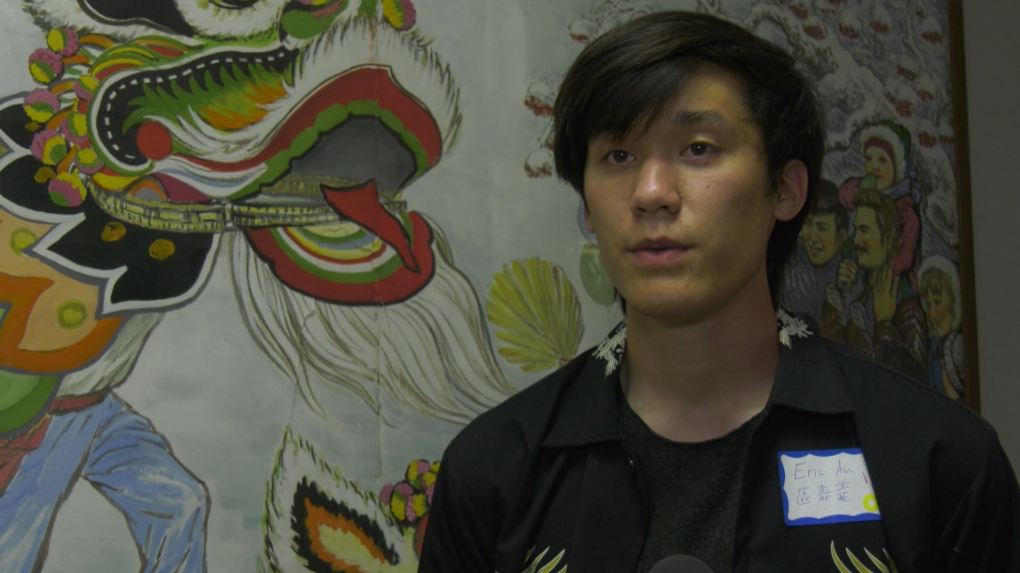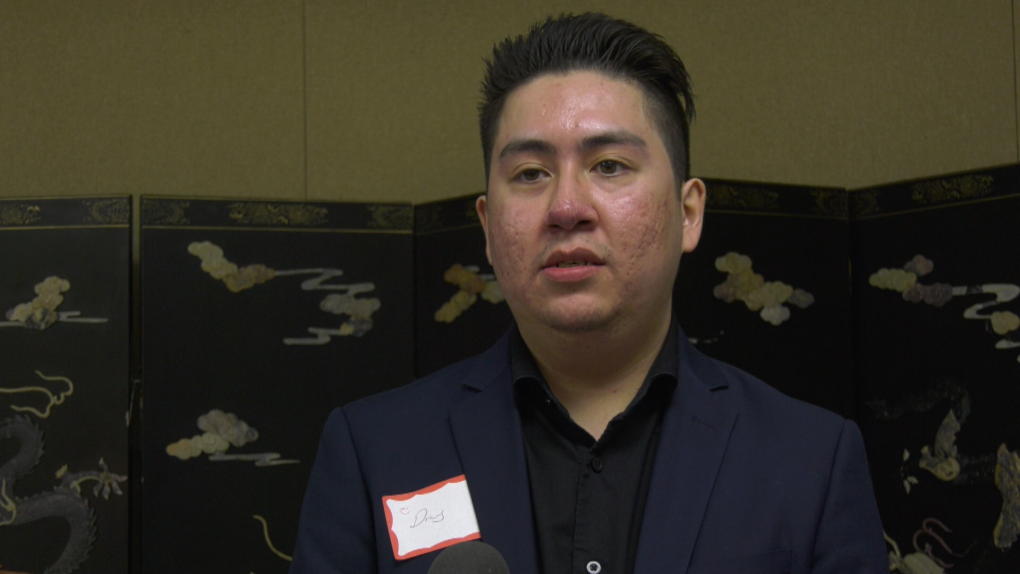From intergenerational trauma to resilience: Edmonton Chinese and Indigenous youth conference builds understanding
Two groups of youth gathered in Edmonton's Chinatown this weekend to help exchange ideas and share their cultures to build greater solidarity.
For the first time in-person, youth from the Enoch Cree Nation and the local Chinese community hosted a series of panels, discussions, and forums, all centred on anti-racism and resiliency.
"We wanted to come together to build understanding between our communities and really get to know each other and building that relationship between the youth and the elders," said Eric Au, Chinese Benevolent Association of Edmonton Youth Council chair.
On Saturday, both groups participated in cultural demonstrations with a powwow, drumming circle, martial arts, and Indigenous and Chinese dances.
The focus turned to anti-racism on Sunday, with discussions demonstrating how racism and intergenerational trauma have impacted Indigenous and Chinese communities in different and parallel ways. The event culminates on Monday with a youth action planning project to help both communities concretely move forward together.
"As we grow up and go through the school system, we get an introduction to Indigenous history and the issues that non-white people face, but really, the need to learn is not very satisfied," Au added.
 Eric Au, Chinese Benevolent Association of Edmonton Youth Council chair, said the pair of youth groups hope to host more events like the cultural conference in the future (CTV News Edmonton/Jessica Robb).
Eric Au, Chinese Benevolent Association of Edmonton Youth Council chair, said the pair of youth groups hope to host more events like the cultural conference in the future (CTV News Edmonton/Jessica Robb).
Dreydon Thomas, Enoch Youth Advisory Council member, explained how the Indigenous reserve system and historical attitudes and policies surrounding Chinatowns across Canada share similarities.
"Chinatowns come out of segregation in Canada, and as new Chinese immigrants used to come here they were put in areas where white people did not want to be," Au said.
"Indigenous peoples, in general, we've been placed on reservations, but also Chinese people have placed, segregated or even pushed to building in Chinatown places. That's where our groups feel comfortable and feel more like a community for ourselves.
"It's important to recognize that these spaces that come out of racist policies and disadvantages to non-white communities also create a place where we can come together and celebrate our cultures."
The youth councils hope that having these "hard-hitting" and difficult conversations will pave the way forward for a better future.
"It can get scary at times," Thomas said. "Building these relationships kind of help us in being able to tackle even bigger decisions, questions, and bigger difficulties."
"It shows the level of maturity and level of support not only to us but to different levels of government that we are able to have these conversations."
 Dreydon Thomas, Enoch Youth Advisory Council member, said while discussing anti-racism can be difficult at times, finding out about shared experiences builds trust and resiliency (CTV News Edmonton/Jessica Robb).
Dreydon Thomas, Enoch Youth Advisory Council member, said while discussing anti-racism can be difficult at times, finding out about shared experiences builds trust and resiliency (CTV News Edmonton/Jessica Robb).
HOPE FOR THE FUTURE
Sixty-five people registered to attend the weekend conference, with proceedings open to respective community members and all Edmontonians.
"If we want long-lasting solutions and we want to connect with those people, it has to be together," Au said.
For Amanda Morin, Enoch Cree Nation councillor, this weekend's conference represents the start of something greater.
"Speaking as an Indigenous woman, we were taught from our history in residential schools and colonialism to not speak," she told CTV News Edmonton. "That spaces weren't safe.
"It's super important as an Indigenous woman, as a mom, as a grandma, as a daughter, a sister, a friend, to be able to create these spaces so that our youth can start breaking those cycles of intergenerational trauma and we now call it intergenerational resiliency, so we can overcome."
As she listened to the youth and elders tackle different issues and approaches to anti-racism, Morin said she was encouraged to see the youth gain more courage to speak and engage.
"It makes me really happy," Morin said. "If you create the space, a safe space, those difficult conversations are no longer difficult and you can find a lot of love and support there.
"As each of our generations come along, they're realizing how similar we all are as humans.
"Realizing that we are not alone in a lot of things we've gone through. Regardless of our race, we're all human and being able to connect and share gives us all hope."
With files from CTV News Edmonton's Jessica Robb
CTVNews.ca Top Stories

Widow looking for answers after Quebec man dies in Texas Ironman competition
The widow of a Quebec man who died competing in an Ironman competition is looking for answers.
Tom Mulcair: Park littered with trash after 'pilot project' is perfect symbol of Trudeau governance
Former NDP leader Tom Mulcair says that what's happening now in a trash-littered federal park in Quebec is a perfect metaphor for how the Trudeau government runs things.
World seeing near breakdown of international law amid wars in Gaza and Ukraine, Amnesty says
The world is seeing a near breakdown of international law amid flagrant rule-breaking in Gaza and Ukraine, multiplying armed conflicts, the rise of authoritarianism and huge rights violations in Sudan, Ethiopia and Myanmar, Amnesty International warned Wednesday as it published its annual report.
Photographer alleges he was forced to watch Megan Thee Stallion have sex and was unfairly fired
A photographer who worked for Megan Thee Stallion said in a lawsuit filed Tuesday that he was forced to watch her have sex, was unfairly fired soon after and was abused as her employee.
Amid concerns over 'collateral damage' Trudeau, Freeland defend capital gains tax change
Facing pushback from physicians and businesspeople over the coming increase to the capital gains inclusion rate, Prime Minister Justin Trudeau and his deputy Chrystia Freeland are standing by their plan to target Canada's highest earners.
U.S. Senate passes bill forcing TikTok's parent company to sell or face ban, sends to Biden for signature
The Senate passed legislation Tuesday that would force TikTok's China-based parent company to sell the social media platform under the threat of a ban, a contentious move by U.S. lawmakers that's expected to face legal challenges.
Wildfire southwest of Peace River spurs evacuation order
People living near a wildfire burning about 15 kilometres southwest of Peace River are being told to evacuate their homes.
U.S. Senate overwhelmingly passes aid for Ukraine, Israel and Taiwan with big bipartisan vote
The U.S. Senate has passed US$95 billion in war aid to Ukraine, Israel and Taiwan, sending the legislation to President Joe Biden after months of delays and contentious debate over how involved the United States should be in foreign wars.
'My stomach dropped': Winnipeg man speaks out after being criminally harassed following single online date
A Winnipeg man said a single date gone wrong led to years of criminal harassment, false arrests, stress and depression.

































